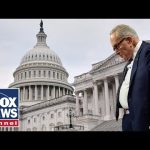In recent discussions surrounding the potential government shutdown, Republican National Committee Chairman Michael explained the issue at hand, particularly focusing on the Democratic Party’s stance and the implications of their demands. It all boils down to a hefty price tag of $1.5 trillion, which Democrats have put on the table as part of what they have termed a “wish list.” This wish list includes demands for various funding initiatives, including controversial health care for illegal immigrants. The crux of the argument is that the Democrats are holding up the government, insisting on their lavish spending before agreeing to keep the government running.
Michael noted that for three decades, Democrats have been vocal critics of any government shutdown discussions. Now, however, they find themselves in the exact situation they used to decry, leveraging the possibility of shut down pressure to push forward their expansive budgetary requests. This, he argues, is not only hypocritical but incredibly frustrating for numerous American citizens who rely on government services.
In response to Democratic claims that every continuing resolution must be bipartisan, Michael offered a differing perspective. He pointed out that every Democrat in the House voted against the last resolution, making it clear that their desires can’t simply include a grandiose spending plan. Instead, he emphasized the need for Democrats to negotiate fairly without attaching “Christmas trees” of excess requests to the discussions.
When it comes to individual Democratic figures, such as Alexandria Ocasio-Cortez, Michael was quick to dismiss her attempts at mediation. He noted that, despite her enthusiasm, she is not a member of the Senate nor part of the leadership that plays a central role in these negotiations. He framed the situation as a Democratic shutdown, one where the responsibilities of protecting borders, supporting veterans, and addressing disaster relief efforts—particularly in places like North Carolina—are at stake.
Michael further discussed the particular political landscape of North Carolina, where there exists a mix of Republican, Democrat, and unaffiliated voters. He argued that constituents in the state would not take kindly to the notion of representatives refusing to engage in collaborative governance, which is essential in a purple state like North Carolina. With the current standstill in negotiations and the absence of a Democratic willingness to come to the table, it seems likely that the voting public will take a hard look at who is really causing the gridlock and the consequences flowing from it.
Ultimately, the implications of all this movement—or lack thereof—will resonate in future elections. People in North Carolina are eager for leadership that manifests in cooperation rather than conflict, even amid a challenging political environment. The fallout from this shutdown threat may very well shape how constituents perceive their leaders and their party alignments as the next election looms on the horizon. In the fast-paced and ever-changing world of politics, it’s clear that voters have their eyes peeled for action over obstruction.




